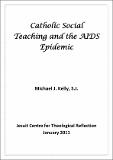Catholic Social Teaching And The AIDS Pandemic

View/
Date
2011-01Author
Kelly, Michael J
Type
BookLanguage
enItem Usage Stats
47
views
views
153
downloads
downloads
Abstract
The Church’s social teaching refers to a body of teaching on social, economic, political and cultural matters developed over a long period by the Catholic Church, but proposed more explicitly and systematically in the years since 1891. The fundamental assumption of this teaching is that each individual is a social being who at every stage of life depends on others for existence and for the fulfillment of spiritual, intellectual, emotional, physical and social needs. Almost seventy years ago, Pope Pius XII expressed this in picturesque language: “individuals do not feel themselves isolated units, like grains of sand, but (are) united by the very force of their nature and by their internal destiny, into an organic, harmonious mutual relationship”. The Second Vatican Council reaffirmed this position very clearly in its statement that the human person is not a solitary being, but a social being who can live and develop his or her full potential only by relating to others.
Description
Several years before HIV and AIDS became matters of concern, the Second Vatican Council highlighted the importance of promoting and protecting many of these rights when it stated that each person should have ready access to all that is necessary for living a genuinely human life, for example, food, clothing, and housing; the right freely to choose his or her state of life and set up a family; the right to education, and to work, a good name, respect and proper knowledge; the right to act according to the dictates of conscience, to safeguard personal privacy, and to rightful freedom in matters of religion.